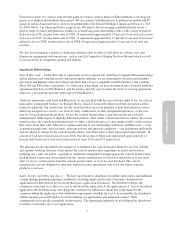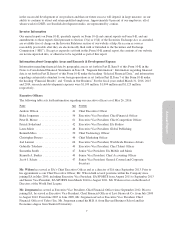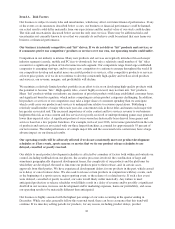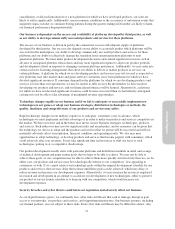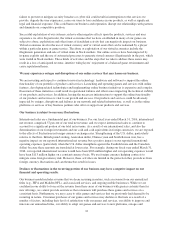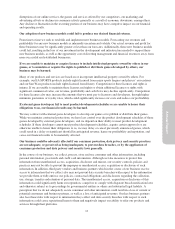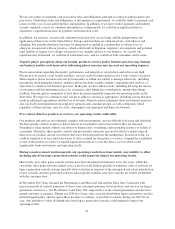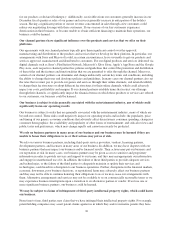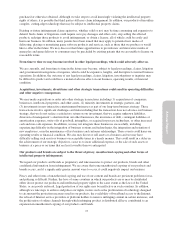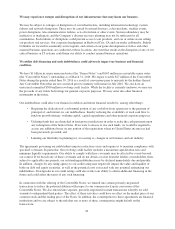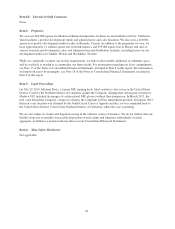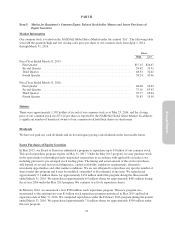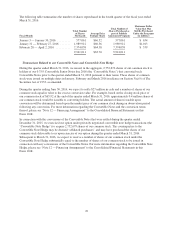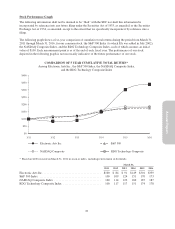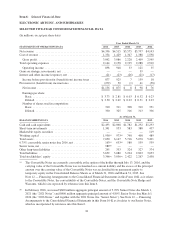Electronic Arts 2016 Annual Report Download - page 100
Download and view the complete annual report
Please find page 100 of the 2016 Electronic Arts annual report below. You can navigate through the pages in the report by either clicking on the pages listed below, or by using the keyword search tool below to find specific information within the annual report.We are also subject to payment card association rules and obligations pursuant to contracts with payment card
processors. Under these rules and obligations, if information is compromised, we could be liable to payment card
issuers for the cost of associated expenses and penalties. In addition, if we fail to follow payment card industry
security standards, even if no consumer information is compromised, we could incur significant fines or
experience a significant increase in payment card transaction costs.
In addition, data privacy, security and consumer-protection laws are evolving, and the interpretation and
application of these laws in the United States, Europe and elsewhere are often uncertain, contradictory and
changing. It is possible that these laws may be interpreted or applied in a manner that is adverse to us or
otherwise inconsistent with our practices, which could result in litigation, regulatory investigations and potential
legal liability or require us to change our practices in a manner adverse to our business. As a result, our
reputation may be harmed, we could incur substantial costs, and we could lose both consumers and revenue.
Negative player perceptions about our brands, products, services and/or business practices may damage
our business and the costs incurred in addressing player concerns may increase our operating expenses.
Player expectations regarding the quality, performance and integrity of our products and services are high.
Players may be critical of our brands, products, services and/or business practices for a wide variety of reasons.
These negative player reactions may not be foreseeable or within our control to manage effectively, including
perceptions about gameplay fairness, negative player reactions to game content, components and services, or
objections to certain of our business practices. In the past, we have taken actions, including delaying the release
of our games and discontinuing services for our games, after taking into consideration, among other things,
feedback from the player community even if those decisions negatively impacted our operating results in the
short term. We expect to continue to take actions to address concerns as appropriate, including actions that may
result in additional expenditures and the loss of revenue. Negative player sentiment about our business practices
also can lead to investigations from regulatory agencies and consumer groups, as well as litigation, which,
regardless of their outcome, may be costly, damaging to our reputation and harm our business.
If we release defective products or services, our operating results could suffer.
Our products and services are extremely complex software programs, and are difficult to develop and distribute.
We have quality controls in place to detect defects in our products and services before they are released.
Nonetheless, these quality controls are subject to human error, overriding, and reasonable resource or technical
constraints. Therefore, these quality controls and preventative measures may not be effective in detecting all
defects in our products and services before they have been released into the marketplace. In such an event, we
could be required to or may find it necessary to offer a refund for the product or service, suspend the availability
or sale of the product or service or expend significant resources to cure the defect, each of which could
significantly harm our business and operating results.
During console system transition periods, our operating results have been volatile. Any inability to offset
declining sales from legacy generation consoles could negatively impact our operating results.
Historically, new video game console systems have been developed and released every few years, which has
caused the video game software market to be cyclical as well. In these periods of transition, sales of software for
legacy generation console systems typically slow or decline in response to the anticipated and actual introduction
of new consoles and new generation software sales typically stabilize after new consoles are widely established
with the consumer base.
In November 2013 Sony released the PlayStation 4 and Microsoft released the Xbox One. Consistent with
previous periods of console transition, we have seen consumers purchase fewer products and services for legacy
generation consoles (i.e., the PlayStation 3 and Xbox 360, respectively) as the current generation consoles have
gained consumer acceptance. During our 2016 fiscal year, sales associated with these legacy generation consoles
declined significantly, and we expect these declines to continue, or possible accelerate, during our 2017 fiscal
year. Any inability to offset declining sales from legacy generation consoles could negatively impact our
operating results.
14



